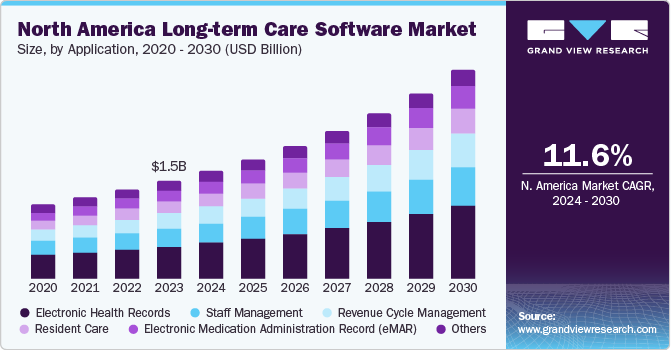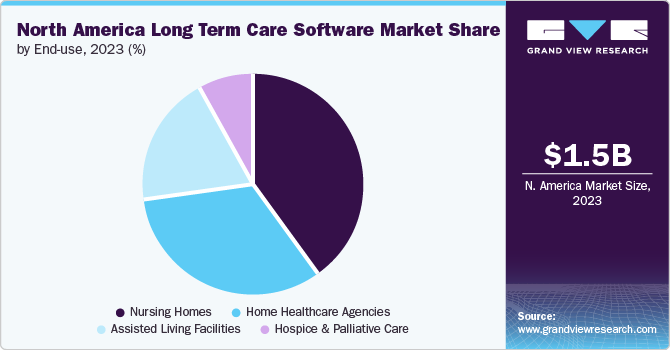- Home
- »
- Healthcare IT
- »
-
North America Long-term Care Software Market, Report, 2030GVR Report cover
![North America Long-term Care Software Market Size, Share & Trends Report]()
North America Long-term Care Software Market Size, Share & Trends Analysis Report By Mode Of Delivery (Cloud, Web), By Application (EHR, Revenue Cycle Management), By End Use, By Country, And Segment Forecasts, 2024 - 2030
- Report ID: GVR-2-68038-653-0
- Number of Report Pages: 70
- Format: PDF, Horizon Databook
- Historical Range: 2018 - 2022
- Forecast Period: 2024 - 2030
- Industry: Healthcare
Market Size & Trends
The North America long-term care software market size was valued at USD 1.54 billion in 2023 and is projected to grow at a CAGR of 11.6% from 2024 to 2030. The market growth is due to the rising number of geriatric patients with chronic illnesses coupled with the demand for efficient management solutions. Healthcare professionals have increasingly adopted long-term care software that provides the necessary tools to manage patient information, streamline operations, and ensure high-quality care. These software solutions can facilitate improved patient outcomes and enhanced efficiency of care delivery with features including electronic healthcare records, medication management, and remote patient monitoring.

In addition, the shift towards patient-centric care models has been a crucial market driver. Modern healthcare infrastructure in North America has increasingly emphasized personalized care tailored to individual patient needs. Long-term care software supports this approach by providing tools for comprehensive care planning, coordination among care teams, and personalized treatment plans. This improves patient satisfaction and ensures better health outcomes. Furthermore, the rising usage of mobile phones, computers and cloud-based technologies in healthcare operations has resulted in market growth. Major market participants have implemented strong measures to safeguard patient data and comply with data protection laws.
Moreover, continuous technological developments, such as Artificial Intelligence (AI), Machine Learning (ML), and telehealth solutions, have progressively transformed the way long-term care is delivered. AI and ML can be used to predict patient needs, optimize care plans, and detect potential health issues before they become critical. Telehealth solutions, on the other hand, enable remote consultations and monitoring, reducing the need for in-person visits and making care more accessible, particularly for those in remote areas. These factors collectively improve efficiency of healthcare processes and enhance the quality of patient care. In addition, the rising per capita income in the region has held positive influence in the adoption of technologically advanced long-term care facilities.
Application Insights
Electronic Health Records (EHRs) dominated with 32.6% of the market share in 2023 owing to the increasing demand for centralized and streamlined healthcare administration. EHR systems facilitate the efficient management of patient data, enabling healthcare providers to access comprehensive medical histories, treatment plans, and diagnostic information from a single platform. This centralization is crucial for improving care coordination and reducing administrative burdens of medication errors and health information exchange. Additionally, technological advancements in EHR systems, including interoperability, mobile access and cloud-based solutions have further propelled the market. These innovations enhance the functionality and accessibility of EHRs, making it easier for healthcare providers to share information across different care settings and collaborate effectively. Cloud-based EHRs, in particular, offer scalability, cost savings, and improved data security.
The Revenue Cycle Management (RCM) segment is expected to grow substantially over the forecast period owing to the increased need of financial efficiency and compliance. Long-term care facilities often deal with multiple payers, including Medicare, Medicaid, and private insurers, each with its own set of rules and regulations. RCM software helps streamline these processes by automating billing, coding, and claims management. Features including automated scheduling, patient registration, and financial analytics, help streamline administrative tasks. They reduce errors, ensure timely reimbursements, and improve resource utilization.
Mode of Delivery Insights
The cloud based solutions segment dominated the market in 2023 owing to their cost-effectiveness. These solutions typically require lower upfront investments compared to traditional on-premises systems, as they do not require extensive hardware and IT infrastructure. Additionally, cloud-based software enables healthcare facilities to record and store data securely in the cloud servers eliminating the threat of fraud or thefts. They can be easily scaled to accommodate the growing needs of long-term care facilities, by adding new users, expanding to new locations, or integrating additional functionalities.

The web-based solutions segment is projected to grow at a CAGR of 11.4% during the forecast period. This market growth can be attributed to the increasing need for accessibility and flexibility. Web-based solutions allow healthcare providers to access patient data and management tools from any location with an internet connection. This is particularly beneficial for long-term care facilities that operate across multiple sites or have staff working remotely. Furthermore, the ease of implementation and maintenance associated with web-based solutions have also driven the market. Unlike traditional software that require complex installations and regular updates, web-based solutions can be deployed faster and updated automatically by the service provider.
End Use Insights
The nursing care segment registered 39.9% of the market share in 2023 due to the increased number of patients with chronic illnesses. The market surge necessitated efficient management solutions to handle the influx of residents and ensure high-quality care. Long-term care software provides the necessary tools to manage patient information, streamline operations, and enhance care delivery. Furthermore, these software solutions help facilities comply with stringent regulations by offering features such as secure data storage, automated reporting, and audit trails.
The home healthcare segment is expected to grow at a CAGR of 12.4% during the forecast period owing to significant technological advancements. Innovations in telehealth, remote patient monitoring, and mobile health applications have progressively transformed home healthcare. These technologies enable healthcare providers to deliver care remotely, monitor patients in real time, and provide timely interventions. Moreover, the increasing geriatric population with chronic conditions has increasingly favored home healthcare for prolonged diagnosis and monitoring. Long-term care software helps reduce operational costs by improving efficiency and reducing errors. This makes it an appealing investment for patients to balance quality care with financial sustainability.
Country Insights
The U.S. long-term care software market held 89.2% of the share in 2023. The country’s well-established healthcare sector including medical institutes has increasingly adopted software solutions to streamline and manage patient data. In addition, the rising number of patients diagnosed with chronic illnesses such as diabetes, cancer, obesity, and heart disease has resulted in a rising demand for long-term care software.
Canada is expected to emerge substantially at a CAGR of 12.1% over the forecast period. This surge is attributable to the increasing incidence of conditions such as diabetes, heart disease, dementia that require continuous monitoring and management. Additionally, government initiatives and healthcare reforms have also played a significant role in driving the market. Policies aimed at improving the quality of care and ensuring patient safety encourage the adoption of advanced software solutions. These initiatives often include funding and incentives for healthcare providers to implement long-term care software, which helps facilities comply with regulatory requirements and improve operational efficiency.
Key North America Long-term Care Software Company Insights
Some of the major companies such as Veradigm LLC (Allscripts Healthcare), Cerner Corporation (Oracle Corporation), and others have focused on improving the product quality with the help of technological advancements, merger and acquisitions, and collaborations.
-
Veradigm LLC (Allscripts Healthcare) specializes in providing electronic health records (EHR) and practice management technology for physician practices, hospitals, and other healthcare providers. The company also provides products for care coordination records and patient engagement.
-
Cerner Corporation (Oracle Corporation) provides health information technology (HIT) services and platforms. The company also offers electronic health record systems.
Key North America Long-term Care Software Companies:
- Veradigm LLC (Allscripts Healthcare)
- Cerner Corporation (Oracle Corporation)
- Netsmart Technologies, Inc.
- MatrixCare
- McKesson Corporation
- VITALS SOFTWARE
- PointClickCare
- Medtelligent, Inc.
- Omnicell, Inc.
- Genexod Technologies LLC
Recent Developments
- In January 2024, VITALS SOFTWARE was acquired by Aline, a senior-living software provider. The acquisition allowed Aline’s enterprise-scale software to be available to the Vitals Software customers along with their current platform.
North America Long-term Care Software Market Report Scope
Report Attribute
Details
Market size value in 2024
USD 1.70 billion
Revenue forecast in 2030
USD 3.29 billion
Growth Rate
CAGR of 11.6% from 2024 to 2030
Base year for estimation
2023
Historical data
2018 - 2022
Forecast period
2024 - 2030
Quantitative units
Revenue in USD million and CAGR from 2024 to 2030
Report coverage
Revenue forecast, company ranking, competitive landscape, growth factors, and trends
Segments covered
Application, mode of delivery, end use, country
Country scope
U.S., Canada, Mexico
Key companies profiled
Veradigm LLC (Allscripts Healthcare), Cerner Corporation (Oracle Corporation), Netsmart Technologies, Inc., MatrixCare, McKesson Corporation, VITALS SOFTWARE, PointClickCare, Medtelligent, Inc., Omnicell, Inc., Genexod Technologies LLC
Customization scope
Free report customization (equivalent up to 8 analysts working days) with purchase. Addition or alteration to country, regional & segment scope.
Pricing and purchase options
Avail customized purchase options to meet your exact research needs. Explore purchase options
North America Long-term Care Software Market Report Segmentation
This report forecasts revenue growth at country levels and provides an analysis of the latest industry trends in each of the sub-segments from 2018 to 2030. For this study, Grand View Research has segmented the global North America long-term care software market report based on application, mode of delivery, end use, and country.
-
Application Outlook (Revenue, USD Million, 2018 - 2030)
-
Electronic Health Records
-
Electronic Medication Administration Record (eMAR)
-
Revenue Cycle Management
-
Resident Care
-
Staff management
-
Others
-
-
Mode of Delivery Outlook (Revenue, USD Million, 2018 - 2030)
-
Cloud based
-
Web based
-
On premise
-
-
End Use Outlook (Revenue, USD Million, 2018 - 2030)
-
Home Healthcare Agencies
-
Hospice & Palliative Care
-
Nursing Homes
-
Assisted Living Facilities
-
-
Country Outlook (Revenue, USD Million, 2018 - 2030)
-
U.S.
-
Canada
-
Mexico
-
Share this report with your colleague or friend.
![gvr icn]()
NEED A CUSTOM REPORT?
We can customize every report - free of charge - including purchasing stand-alone sections or country-level reports, as well as offer affordable discounts for start-ups & universities. Contact us now
![Certified Icon]()
We are GDPR and CCPA compliant! Your transaction & personal information is safe and secure. For more details, please read our privacy policy.
We are committed towards customer satisfaction, and quality service.
"The quality of research they have done for us has been excellent."





